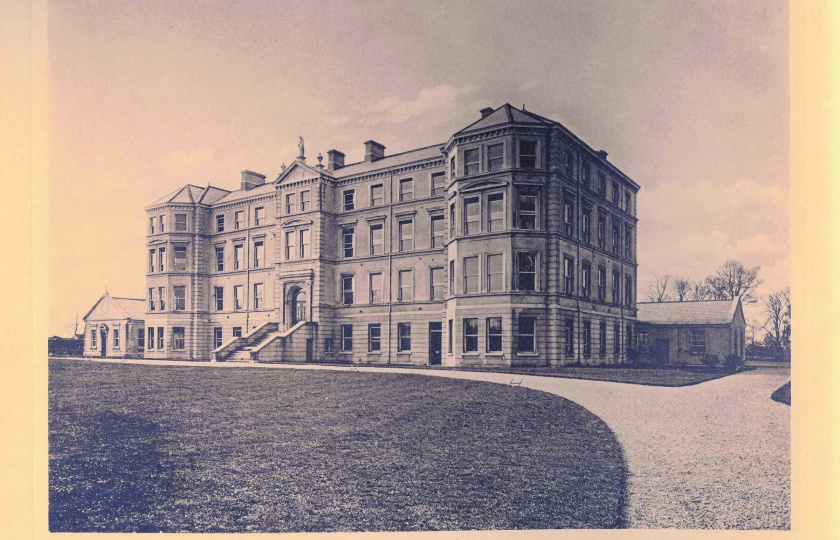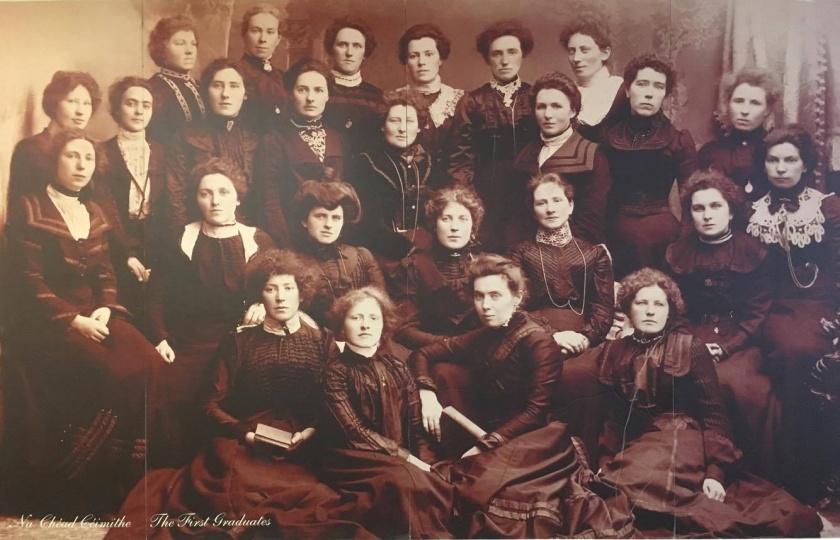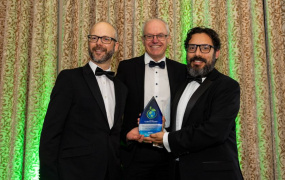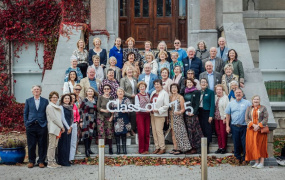Mission, Vision, Values & History
About
Founded in 1898, by Catholic Sisters of Mercy and the Bishop of Limerick, Edmund T O’Dwyer, Mary Immaculate College (MIC) is the oldest third level institution in Limerick. The College has expanded significantly since 75 young women were enrolled in 1901, not just in student numbers but in geographical footprint, academic provision and ambition.

Foundation & Enduring Vision
When the foundation stone for Mary Immaculate College was laid in 1899, the intention was to provide an institution dedicated to the professional training of female teachers for the Catholic national school system. Today, with close to 5,000 young men and women enrolled at the College and participating in a multitude of academic programmes, MIC continues to embrace the founding vision of Catherine McAuley, who established the Catholic Sisters of Mercy as champions for the most marginalised in society with the conviction that education was essential to the quality of life to which all individuals should be entitled. These enduring values remain enshrined in the College Mission Statement as Mary Immaculate College steers a new course in the 21st century.

Mission Statement
Mary Immaculate College, Limerick, founded in 1898, is a third level Catholic College of Education and the Liberal Arts.
The College community promotes excellence in teaching, learning and research at undergraduate and postgraduate levels. It seeks to foster the intellectual, spiritual, personal and professional development of students within a supportive and challenging environment that guarantees the intellectual freedom of staff and students.
In particular, the College seeks to foster in its students a spirit of justice and compassion in the service of others, together with an openness to the religious tradition and values of each individual.
The College promotes a sense of identity enriched by an awareness of its Catholic tradition, the cultures, languages and traditions of Ireland, and its special commitment to the Irish language.
Mary Immaculate College respects cultural diversity. It strives to promote equity in society and to provide an environment where all have freedom and opportunity to achieve their full potential.
Ráiteas Misin
Is Coláiste Caitliceach tríú leibhéal Oideachais agus Saorealaíon é Coláiste Mhuire Gan Smál, Luimneach, a bunaíodh in 1898.
Cuireann pobal an Choláiste ardchaighdeán feabhais chun cinn ó thaobh múinteoireachta, foghlama agus taighde ag an leibhéal céime agus iarchéime. Déantar iarracht forbairt intleachtúil, spioradálta, phearsanta agus ghairmiúil na mac léinn a chothú laistigh de thimpeallacht chabhrach agus dúshlánach a chuireann saoirse intleachtúil na foirne agus na mac léinn chun tosaigh.
Tá sé mar aidhm ag an gColáiste, go háirithe, cothrom na féinne agus ómós a chothú ina gcuid mac léinn, agus iad ag freastal ar dhaoine eile, chomh maith le bheith oscailte do na traidisiúin agus do na luachanna reiligiúnacha a bhíonn ag gach duine aonair.
Cuireann an Coláiste féinaithne chun cinn a bhfuil traidisiún Caitliceach an Choláiste mar chuid shaibhir di, chomh maith le cultúr, teangacha agus traidisiúin na hÉireann agus tiomantas speisialta an Choláiste don Ghaeilge.
Tá omós ag Coláiste Mhuire gan Smál d’éagsúlacht cultúir. Oibríonn an Coláiste chun cothromaíocht a chur chun cinn sa tsochaí agus chun timpeallacht a chur ar fáil ina mbeidh an tsaoirse agus an deis ag gach duine a gcumas iomlán a bhaint amach.
Our Vision / Ár bhFís
Our Vision
Based on the direction and pace of development at MIC during the most recent period of the College’s history, a well-founded appreciation of our essential standing within the Irish higher education system, and with a keen sense of the opportunities for further strategic advancement of our core mission, our vision for the institution in 2023 is as follows:
- MIC is an ambitious university-level institution in the Catholic intellectual tradition, providing a unique learning experience within an ideal ambience for higher education participation. It is active in research that informs its teaching directly, and contributes richly to academia. The College is outward-looking, with strengthened international linkages, and is a resource placed purposefully at the heart of the civic commons. It is an active and innovative contributing partner in the economic, social and cultural development both of its surrounding environs and of the broader Irish educational landscape, helping, in particular, to sustain the vital spirit of collaboration within the higher education system.
- The College endeavours to offer its students the means to a flourishing life through the highest quality of academic engagement within a rounded and holistic context of participation.
- The College calls upon its learning community to make a difference in the broader world, bearing in mind a received obligation to galvanise efforts to foster social justice and promote equality for the most marginalised.
Learn more about the MIC Strategic Plan 2023 - A Flourishing Learning Community here.
Ár bhFís
Bunaithe ar threoir agus ar luas na forbartha curtha i gcrích i gCMgS le linn na tréimhse is déanaí de stair an Choláiste, bunaithe ar tuiscint dhea-bhunaithe dár mbun-sheasamh laistigh de chóras ardoideachais na hÉireann, agus le tuiscint mhaith ar na deiseanna chun tuilleadh forbartha straitéisigh a dhéanamh ar ár mbun-mhisean, seo a leanas ár bhfís don institiúid i 2023:
- Is institiúid uaillmhianach, ag leibhéal ollscoile é CMgS sa traidisiún intleachtúil Chaitliceach, ina sholáthraítear taithí foghlama uathúil laistigh de chomhthimpeallacht idéalach do rannpháirtíocht ardoideachais. Tá sé gníomhach i dtaighde a fheidhmíonn mar chrann-taca dá theagasc, agus cuireann sé go mór leis an saol acadúil. Is mian leis an gColáiste cur lena naisc idirnáisiúnta, agus is acmhainn é atá suite, go cuspóireach, i gcroílár na gcoimíneachta sibhialta. Is páirtí rannpháirteach gníomhach agus nuálaíoch é i bhforbairt eacnamaíoch, shóisialta agus chultúrtha an dá cheantar máguaird agus i dtírdhreach níos leithne an oideachais in Éirinn, rud a chabhraíonn, go háirithe, chun spiorad ríthábhachtach an chomhoibrithe a chothú laistigh den chóras ardoideachais.
- Tá an Coláiste ag iarraidh bealaí a thairiscint dá mhic léinn chun saol faoi bhláth a bhaint amach tríd an caighdeán is airde rannpháirtíochta acadúla a sholáthar laistigh de chomhthéacs iomlán na rannpháirtíochta
- Iarrann an Coláiste ar phobal foghlama an Choláiste difríocht a dhéanamh sa domhan níos leithne, ag tógaint san áireamh ár n-oibleagáid iarrachtaí a spreagadh ar mhaithe le ceartais shóisialta a chothú agus le comhionannas a chur chun cinn do na daoine is mó ar an imeall.
Plean Straitéiseach CMgS 2023 - Pobal Foghlama Faoi Bhláth. Cliceáil anseo.
Our Values / Luachanna
Our Values
Our core values will guide and underpin our actions in the realisation of this plan, the MIC Strategic Plan 2023. They are:
- Excellence
- Catholic Intellectual Tradition
- Equality, Diversity & Inclusion
- Social Justice
- Community
- Academic Freedom
- Flourishing Life
Luachanna
Feidhmeoidh ár bpríomhluachanna mar threoir agus mar chranntaca dár ngníomhartha chun an Plean seo a chur i bhfeidhm.
- Barr Feabhais
- Traidisiún Intleachtúil Chaitliceach
- Comhionannas, Éagsúlacht & Cuimsiú
- Ceartas Sóisialta
- Pobal
- Saoirse Acadúil
- Saol Faoi Bhláth
Milestones
Since its foundation, the College has grown consistently and diversified, with many significant milestones reached throughout the twentieth century. The advances of the last 20 years have been particularly remarkable, with a major expansion in academic offerings and a phase of intensive development of campus infrastructure accompanying a constant surge in student numbers from 75 in 1901 to more than 5,000 today.
Visit the MIC Timeline and travel through history exploring the College’s many significant milestones throughout the years.

MIC Presidents
- Sr Paul Quinlan (1898)
- Sr Veronica Cullinan (1923)
- Sr Celsus Barry (1945)
- Sr Rosalie Loughnane (1952)
- Sr Loretto Ní Chonchúir (1959)
- Sr Cabrini Moloney (1979)
- Sr Angela Butler (1988)
- Prof. Peadar Cremin (1999)
- Prof. Michael Hayes (2011)
- Prof. Eugene Wall (2018, acting president since Jan 2017)
- Prof. Dermot Nestor (2024, President Designate)
- About
- Our Vision / Ár bhFís
- Our Values / Luachanna
- Milestones
- MIC Presidents







